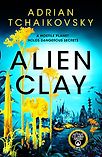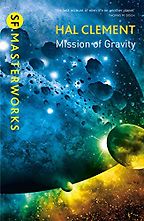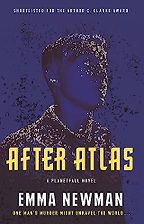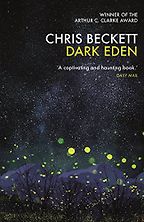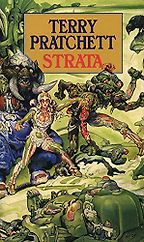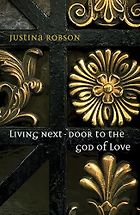‘Hard’ science
fiction is concerned with scientific accuracy. It’s obvious this adds huge constraints on you as a writer – what are the rewards?
It’s interesting, a lot of the time when you’re working with constraints, you write things you’d never otherwise write. I really enjoy writing fantasy fiction, where the only constraints are the ones you’re setting yourself, but that will generally go down a certain way and follow a certain path. If you’re writing with the left wall of actually fitting in with the science, then that pushes you into interesting territory. It gives you places to go that you wouldn’t otherwise have got to yourself, just purely off the back of your own imagination.
So you find yourself leaving the usual mythic patterns of fantasy?
I try to do different and interesting stuff when I’m doing fantasy too. But the thing with fantasy is, I can do what I want with the world, and then it’s about working within that creation. You start off with your big sketch, and then you fill in lots of little details as you go on, but you’re still within the sketch that you made. When you’re working in other settings like hard science fiction – or, say, in a historical setting, which has similar kinds of constraints – that initial sketch is given to you from the outside. You get to work within those lines, but the lines themselves are immutable.s
Let’s talk about your first choice. It’s the earliest book on your list, and has been retro-Hugo-nominated… Tell us about A Mission of Gravity by Hal Clement.
Despite the fact that I’m known as someone who is doing modern takes on classic sci fi, I’m not actually a great reader of that whole ‘golden age’ thing. I’ve read a bit of Asimov, a bit of Clarke and a handful of others, but in general, I much prefer to read current sci fi written by living authors. A Mission of Gravity is one of those older stories, it’s from the mid 1950s, and it’s one of those I was aware of for a long time, because it is talked about a great deal – and very justifiably. It’s got some really interesting aliens. I’ve got a book coming out called Shroud in 2025 which I was aware might end up clashing with some of the territory in this very well-known story. So I thought, right, I’d better read it.
I was very glad I did! Not because it was a clash that I was going to have a problem with, but because it turned out to be a really fun story from the alien perspective, and a really fascinating story from the perspective of the history of science fiction writing. The basic shtick is, there is a planet that’s a very weird shape, which means that the effective gravity of the planet varies depending on where you are – because your distance from the centre of the planet is varying. Humans can just about manage on the least gravitic parts of the planet, although it’s got a very hostile atmosphere. But the local species exist all over the planet. They are very flat, centipede-like creatures. So this is one case where Golden Age sci fi is delivering a really fascinating alien concept. You get a lot of sections of the book from the point of view of the aliens.
There’s a thing the humans need to recover, which has crashed in one of the highest gravity areas. So the humans are trying to get the aliens to go and get it for them, because they have no other way of getting it back. From the humans’ perspective, they are absolutely exploiting these aliens who they feel are probably not terribly clever. The aliens are technologically sophisticated to very roughly an Age of Enlightenment level; they’re getting to the point where they’re curious about their own world, but traveling around their own world is very difficult. One of the things I love most about them is that they have an absolutely crippling fear of heights, because in the high gravity areas, a fall of a couple of inches will kill you – so that’s a very basic element of their psychology.
The aliens are very wise to what the humans are doing. They spend a lot of time thinking, “How can we use this arrangement to our advantage once we’ve got this thing? What will the humans give us for it? What concessions can we wring from them? What do we understand about what the humans even are?” So it’s not a case of the dumb alien being outmanoeuvred by the superior Earthman, which was a lot of the fiction at that time, especially for younger readers.
Sounds refreshing!
The alien part of the narrative, which is probably about 75% of the book, is extremely good. The human part of the narrative is very of-its-time, which is to say that the educated-white-men college-professor types who are on this mission spend their time sorting through big piles of paper and smoking pipes on their spaceship. It reads very weirdly to the modern eye, because they are so 1950s. An awful lot of science fiction at the time didn’t really consider the idea that going to space would change people. The idea was that we would discover stuff and we would invent stuff, but people would be absolutely the same—even down to coming from 1950s America. I tend to refer to this as the ‘time machine factory problem’: you have a lot of these short stories where our hero gets back from a hard day’s work at the time machine factory, and his wife has got dinner on the table, and he’s gone back to his little apartment and all of that… It’s literally 1950s America, and the fact that you have time machines in mass production has made no difference at all. It’s a very common thing in 1950s and 1960s sci fi, and it absolutely is on show here in the human narrative; but at the same time you have this amazing alien story, and they are some of the best aliens in classic science fiction.
So there are two really good reasons to read this book, which is very readable and fairly short – almost novella length. One is the great alien stuff, and the other is that it’s a fascinating artifact in the history of sci fi.
Let’s jump forward then to a space story from 2016, your next choice, which certainly does take social impact into account: tell us about After Atlas, by Emma Newman.
Emma Newman, like myself, writes both fantasy and science fiction. She does both extremely well. This four-book series started with Planetfall, which deals with the ship Atlas, going to a weird alien planet and discovering a very weird alien thing, which answers no questions. It’s just there. The humans can’t work out what the point of it is, and there’s nothing else. So that book deals with the colony, which has gone to this place, and found the thing they were promised – and then it’s gone nowhere.
And then we have After Atlas, which is back on Earth, after Atlas has left. Atlas has taken the best and the brightest, and an enormous slice of global resources. It’s similar to having an enormous plague or a war or something like that: there has been this colossal hit to the world. You have a malevolent-corporation, dark-future situation, and everyone is on the breadline. If you’re not useful, you don’t get any food.
The main character is a sort of corporate investigator. He’s gone through a weird childhood where he’s been forcibly psychologically modified to make him a better investigator, which gives him all manner of psychological issues, as you can imagine. The story follows him getting involved in a case which leads to a colossal global thing that’s going on… which I’m not in any way going to spoil.
Ah, but I’m so intrigued!
This book was nominated for the Clarke awards. I’d have loved it to win, honestly, it was definitely my favourite of the set at the time. Close to the end, there is one of the most phenomenal gut punches of emotional twist that I have ever come across in any book. There aren’t that many books I’ve read that have a moment where you have to put the book down and process what has just happened before you can carry on with the narrative. And this is absolutely one of them.
The other thing Emma does in this book, and in most of the books in this series, is look at mental disability in a science fiction setting. The characters are wrestling with problems in a way that you very seldom see in science fiction. Sci fi and fantasy both have a problematic history with depicting disability of any kind. It’s better now than it was by some considerable margin; but just as there were great difficulties with sci fi depicting gender and depicting race, disability is another one where it’s just invisible in a lot of places. You just don’t get disabled characters, or you have that very awkward thing of a future where theoretically, technology can erase disability, and that in itself is problematic. There is an enormous, very complicated dialogue to be had about that which I don’t propose getting into now. But in this series of books, mental disability is looked at in a very sympathetic, detailed and convincing way.
So again, there are two reasons to read this book, and in fact this whole series. It’s going into that social territory where a lot of sci fi doesn’t go. And it’s an amazing, phenomenal and really quite traumatic story. The series as a whole is very good, but this one is my favourite. You don’t have to have read Planetfall to read this one, it works very well on its own; but you get that extra background context of what the Atlas was, and why it was such a tragic waste sending all of that stuff off into space – because they found very little when they got there.
Your third choice is often described as social sci fi – so it’s another case where hard science fiction also looks at social implications. Tell us about Chris Beckett’s Dark Eden.
Dark Eden was the winner of the Arthur C. Clarke Award in 2012. It’s one of those books which has genuinely been a great inspiration to me. I suspect I would not have written Children of Time – or any number of post-tech alien world books, like the Expert System books and Elder Race – if I hadn’t read Dark Eden. So I owe Chris and this book a great debt.
It’s one of a trilogy. The trilogy as a whole is very good, and for that matter, I think all of Chris’s writing is very good – and I think I’ve read most of what he’s written. Dark Eden is actually – and this is something that Chris does quite a bit – a follow-up to a longish short story he wrote, which you do not in any way need to have read. In fact, I think it works better if you haven’t, and then you come to the short story afterwards.
The setup is that there was a crashed ship on an alien planet, and a very small number of survivors. There were five, and then three of them went off to try and get back to the orbital ship: so there are two, a man and a woman. And because the people who went off just never come back – and we do find out that they’re absolutely not going to come back – nature takes its course…. Some generations later, you have a community of people with a number of congenital birth defects, because you’ve got genetic problems when you’re all descended from the same two people, living in one location on this not terribly hospitable world. It’s very cold, and it’s dark, because it is a world without a star. It’s geologically active, and you get hints that actually there is an incredible wealth of life on this world, mostly underground, in conditions that humans couldn’t survive. The humans are interacting with the extremophile fringes of this world’s ecosystem – which in itself is such a fascinating idea. And throughout the series, you get the general sense that there is a lot of stuff going on in this world that the humans never see.
What we do see is really interesting. Beckett depicts life that has adapted to this very inhospitable environment. The humans have made a mythology around the events of the crash and their original parents, and very small things have become big myths – so there is, for example, one myth they tell about what is very obviously just a spat between the two parents, who didn’t really get on. And that has become like the arguments of the gods in heaven. It’s something that the original children remember, and then that has been passed down and passed down and passed down again.
Amazing!
There are two reasons, really, why this book is astonishing. First, this idea of seeing society reinvented and constructed – and then starting to deform and buckle, because they’re running out of space in this little crater they live in. The areas between these craters are completely inhospitable, but during the book, a breakaway group of people decides: “Right, we are going to find another place. There is another crater.” We know we are going to do an odyssey across to this other place. And we see the idea of this one founding civilization fracturing into factions, and the way that control shifts towards the warmongers and the troublemakers and so forth – in a way that obviously we, in our enlightened times, couldn’t possibly imagine. So that’s the social study. And then paired to that, Chris has done an absolutely bang-up job creating this incredibly immersive alien world – and like I say, an alien world which is very obviously far more complicated than we see. We just get these little glimpses of how much more there must be underneath the surface. These two things together make a wonderful book. I’m always fascinated by the idea of post-tech colonies, and this is one of the most extreme ones, because it comes from such desperate starting conditions. The way that mythology and belief and religion can be reinvented based on small chance occurrences, and then become big social restrictions and mores… This is one of the best examples of that genre of fiction.
I’d like to ask a little more about his alternative biology – does he show his workings, or is it just that a trained biological eye would know that it all hangs together?
Oh, he doesn’t do the sort of exposition stuff I do in Children of Time, to his credit! If you’ve got the background, you can see the logic behind a lot of what he’s showing. So for example, because it’s dark, there is one creature that hunts by sonar and also throws its voice – it uses echoes to confuse where it’s coming from. This is a holy terror to the humans who encounter it while they’re moving between habitable craters. This is not a predator they’re used to. Beckett is communicating what’s going on to us, the reader, without the characters getting it, because they don’t have the perspective to understand. As a reader you think, “Oh, this is the adaptation that’s going on. It makes perfect sense for that to arise in this environment.” But it’s almost something supernatural to the human characters involved, because they don’t have the context.
That’s fascinating – to have sci fi characters more ignorant of scientific developments than the reader…
It’s not uncommon, and it’s something I particularly love. I write it quite a bit – with things like Service Model, where the main robot character has no grasp of what’s going on most of the time, but hopefully the readers can pick up what he doesn’t. It’s not uncommon in sci fi to have a world the main point of view characters don’t understand – you get it in Jack Vance, and you especially get it in Gene Wolfe, and that kind of thing.
Let’s talk about your own book Alien Clay here, because this is a world the characters certainly don’t understand. Could you introduce the book, and tell us a little about the starting point for the ideas?
Alien Clay is a book of mine that came out in 2024, and it’s another two-part book, really. The main impetus was that I wanted to write about a weird alien ecosystem, specifically an ecosystem where the evolution doesn’t follow traditional Darwinian lines. So in the world of Kiln, the biology is almost ridiculously symbiotic, so that each apparently individual creature is a melange of various creatures, each of which does a particular thing. You might have a creature that has good legs to walk it around, and one with a good digestive system and one with a good prey capture system, and they all Lego together to make this big monster. But you might find those same legs walking something else around elsewhere on the planet. They’re all kind of modular, and they interchange parts.
This is very vexing for the human research team who are on the planet. There are a small number of staff, and then a large number of convict labourers, sent by this phenomenally unpleasant authoritarian regime called the Mandate. The Mandate believe that they are destined to run their nasty little regime because of science, and they have a slogan, which says the universe has a direction, and the direction is us. And then they find this world where the universe, the biology of the world, is patently not going in any direction they recognise, and they send their government appointed scientists, saying, “Make sense of this. Make it make sense in a way that is politically orthodox, so that we can show that the universe is basically designed to produce things that are human and earth-like, and indeed authoritarian”.
The main character is a dissident scientist who’s been sent along with the labour force, and the book is really an exploration both of human divisions, and the weird indivisibility of this sort of insane alien ecosphere. Obviously there is a philosophical point there about unity and division, but there’s also just a lot of fun, weird alien stuff, because that’s what I like to write.
I was curious about which was the starting point. The science being explored is – well, beyond even a metaphor – it’s more a demonstration of possible social change…
I luck into quite a lot! I wanted to write about the weird aliens. I knew I needed a human perspective, and it occurred to me that I would do that prison camp thing, which is an idea I’ve talked about in different ways in other books. But then, rather like the things on the planet, the two ideas started to grow together and ended up benefiting from each other in ways I hadn’t particularly anticipated when I started the book. So there’s a lot of serendipity in that.
Well it’s beautiful serendipity. How does the research begin? This alternative approach to evolution is not exactly a neat scientific question you can read about…
I didn’t really do formal research for Alien Clay. I was very much relying on my existing stock. I’d previously delved into how authoritarian regimes work, and the human side of it, because I knew I wanted to write a book about that at some point. From the alien side, I’ve got a fairly good handle on theories of evolution – it is part of my stock-in-trade, and I’ve written a variety of other related books, most especially The Doors of Eden. So I’ve been thinking for a while about the question, how else could it work? What do you have to do not to end up fitting into the standard Darwinian competition model?
Evolutionary ideas as politics caught on very quickly. During Darwin’s life, you very quickly saw people adopting the idea – “Alright, if we can’t use divine right and God to justify why we’re on top and they are not, we will make it a science thing. And Mr. Darwin has come along saying, survival of the fittest. So obviously, because we are doing better than them, we are fitter, and ergo, this is how the world is supposed to be.” People produced all manner of phenomenally racist stuff feeding off Darwinian ideas that, as is frequently the case with science, they did not particularly understand, but they were very happy to parrot to make their point. So the idea of science having to suborn itself to political ideology is absolutely a thing. It’s been used by a wide variety of campaigns and regimes to prop themselves up. There’s some weird part of human psychology whereby just having all the guns and all the physical, hard power does not seem to be enough for dictators: they’ve got to justify their position with reference to some larger mythology or higher power, whether it is religious or scientific or mythological. We need people to believe we are meant to be on top. I genuinely don’t think it’s simply that people will cause less trouble that way – I think that psychologically, dictators themselves feel the need to believe that they are in some way special and chosen and permitted to do what they do. So that’s the Mandate: it demands that the universe play by the rules that it set out, because those rules allow the Mandate to win.
We’ve come to your fourth choice now… This is a writer that some people might be surprised to find on a hard science fiction list! Please introduce us to Terry Pratchett’s Strata.
So obviously Terry Pratchett is a name that almost everyone will know, but people may not know that before he became an enormous writing star with the Discworld books, he had written a few other very non-Discworld books, including a couple of genuinely fascinating hard sci fi books. They are written for younger readers. There’s one called The Dark Side of the Sun, which is also very good, but my absolute favourite is Strata. This book will always have a place close to my heart because it’s one of the first books I read as a teenager that just had a completely jaw-dropping reveal, that turns absolutely everything going on in the book completely on its head. Strata is one, and Diana Wynne Jones wrote the others.
It was written before he started the Discworld books, but it is the proto Discworld book, weirdly enough, because it’s a hard science fiction book where the space explorers discover a flat earth. It’s not on an elephant on a turtle, alas, but it is a completely impossible flat earth that has patently been made by some unbelievably powerful elder civilization. And the main characters come from a civilization of terraformers who got their terraforming technology from a different incredibly powerful alien civilization, and that group itself was aware of a past civilization… There is this idea of continuous creation, where the idea of a natural universe may, in fact, be a complete fiction, because there appears to be this history of everything in the universe being changed artificially by various civilizations for their own conditions, even down to early stars. So these terraformers are aware that they’re working in that tradition. And they found this artifact that seems to point to some other creative civilization they were not aware of.
Obviously, they want to go and explore it. It’s a flat Earth – it’s not just a flat world, it’s a flat Earth. It seems to be operating circa the ninth century: there are basically Vikings, there is a sort of church – there are recognizable cultures and nations and things like that. So what on earth is going on? That’s what the book is about. And when you find out what is going on – or certainly, when I found out what was going on when I was whatever-teen – it was such a gobsmacking moment of revelation, I have never forgotten it.
It is genuinely fascinating. It’s big science fiction stuff, despite the fact that this flat Earth comes complete with medieval stuff like dragons. It is absolutely hard sci fi, and really thought-provoking. I can’t quite remember how old Pratchett was when he wrote this, but he was very young. You can see his trademark imagination, and also a lot of his trademark humour fully on display before he even gets as far as The Colour of Magic.
So tonally, this will feel familiar to Pratchett fans?
It’s not the full-on comedy of the Discworld books. But there’s a lot of light-heartedness, it’s a very amusing read. The main character’s voice is wry and humorous, and there’s a certain amount of situational slapstick… There’s a tradition he’s writing in, the idea of ‘very advanced space-farers find medieval planet and have zany adventures’ – and honestly, I think he’s writing it considerably better than most of the established writers he’s bouncing off. But you’ve got a lot of that fun. And a lot of situations where, yes, you’ve got all this amazing technology, and then something goes wrong, and you suddenly find out how much you were relying on the amazing technology, once you have been divested of it. Also there are some very fun aliens; only one of the crew of the ship is human.
You’ve touched on this idea a couple of times… What makes a fun alien?
A lot of fun aliens are fun because they’ve got some really interesting speculative biology behind them. In this case, they’re fun just because they are two very fun characters. There is an enormous bear thing, which is also a multilingual, very gentle scholar – up until she gets hungry. And then there is the last of a group of old feudal warriors, who no longer do that sort of thing. This is a character type that I have gone back to a few times myself, and it’s absolutely inspired by this character, who I remember loving at the time. The very quirky descriptive language that Pratchett is known for is there…. We go to a planet that’s very wet, with big tides, and everyone goes around in little boats. There’s one bit where he’s describing a community of these people punting about in little coracles as a ‘regatta for golems’, which I just love and has stayed with me.
We’ve come to your last choice: please tell us about Justina Robson’s Living Next Door to the God of Love.
Justina Robson is another writer who is astonishingly inventive. Pretty much everything she’s written is absolutely top notch, really boundary pushing science fiction. I think one of her more recent books, Glorious Angels, could have been on this list, and is start-to-finish one of the most mind-blowingly weird alien worlds and post-human civilizations… Post-humanity is one of the big strengths of her writing. She also wrote a novella called Paper Hearts, which is the go-to book for the question, what if we did have a God-like AI solving our problems? How would that work?
Living Next Door to the God of Love is an exploration of the post-human, and it follows on from Natural History – which you don’t need to have read. You have a pretty advanced human world, with a certain level of artificial intelligence and people in artificial bodies and all that sort of thing. And then in Natural History we have our first contact with this alien entity. And even that is… it’s hard to pin down just what the word would be. It’s almost like an alien dimension that is a single being, and this alien dimension is fairly acquisitive when it comes to adding people to itself. But when we start off Living Next Door to the God of Love a detente has been agreed between ‘the stuff’ – which is how they refer to this alien – and people. The idea is that the stuff will just make worlds – you want a world where you can be a superhero? Here it is! And here’s a world where you can have fantasy adventures… The only downside is that the more you interact with these perfect, amazing dream-worlds, the more you’re just gradually becoming more stuff. At some point you will just be stuff, and you will be part of this enormous… not even hive mind, this singular entity that is a universe of absorbed consciousnesses. This would probably be fine, except that when we start the book, one of these worlds has just been forcibly and completely incorporated into the stuff: everyone on it is just gone. Which points out to the humans involved that while they thought they were making a deal, they have zero way of enforcing its terms.
What’s really going on is that there is another another god-like entity out there that is not part of the stuff; and the stuff is very, very vexed about this, and wants it. Taking this entire world with thousands of people into itself without warning was part of it trying to close the trap, and failing. And this other entity, the God of love of the title, then falls in with a regular human person in another of these stuff worlds, and with this super alien consciousness still hunting it, sending out parts of itself… The entity being hunted is itself a kind of a rogue part of it.
The reason this book is amazing is that you get to see the workings of these entities, both the rogue part and the loyal part, possibly the least human things ever, interacting with humans. And you get to see things from their point of view. Robson does not in any way skimp on the alienness of it, but at the same time, it is perfectly comprehensible to a human reader, which is the dream – certainly for the sort of science fiction I write. And this, I think, is a better example of it than I’ve ever put on paper. It’s genuinely amazing.
There are also parts of this book which are absolutely brutal, and parts that are running at that cutting edge of ‘indistinguishable from magic’ – that very, very high end of sci fi, the sort of thing that Banks worked with. But I think Robson is more interested in the genuine scientific logic of it; Banks was more interested in the social and the adventure side. I don’t think I’ve ever read anything else quite like it, it’s an amazing read, and it’s very, very affecting. And like I say, the depiction of non-human characters, which is something that Robson is extremely good at throughout all of her writing, is just absolutely mind blowing.
It strikes me, as Alien Clay did, how this requires the writer to wrestle with more than science – this is philosophy, really, philosophy of mind and personhood.
Yes. You build up to the question ‘how does the thing think?’. You’ve got ideas: where did it come from, what are the constraints on it, what’s the environment it’s come out of… A certain slice of sci fi has tended to do aliens as just people with funny heads and reduced emotional palettes. We tend to do post-human as, basically it’s a human, but maybe it’s a little smoother or a little more detached from its biology. But Robson goes the full way and says, if you leave humanity behind you’re not going to go around being perfectly urbane and nice and just happening to have a weird robot monster body or something like that. It’s going to change you. And if you are something that is so completely unhuman, like the god-like entities she’s describing, any humanity is going to be a very thin veneer floating on the surface.
In your list we’ve seen hard science fiction books that are inevitably also politics books, and others that are inevitably also philosophy books… Can the idea of a pure hard sci fi book, only concerned with the biology or physics, really exist?
I’m trying to think, if anyone is writing stuff like that at the moment… I was working on some Stanislaw Lem stuff earlier in the year, and I read the series of Pilot Prix stories which go from the mid 60s, so before the moon landing, well into the 70s. And that was really interesting, because early on, he’s talking about the science; there is a certain amount of social stuff, but it’s for laughs. It’s not the focus of the book in any way. The focus of the book is very much, here is a technical challenge, and here is how we solve it. That was written at a time when the thrill of science fiction was being in space, and that was all you needed, because that was sufficiently novel. Then you see that shift as you go through; he starts doing robots, and by the time you get to the story I was actually asked to adapt, he is asking, what if you had robots replacing people? Which is one of the base conditions of science fiction from the very, very start, artificial people; it’s one of the oldest tropes in science fiction. Arguably Mary Shelley’s Frankenstein is doing artificial people. Certainly R.U.R. is doing artificial people. The idea of how we interact with our artificial people is a science fiction question, but at the same time, it’s a political and philosophical question.
It’s a bit tired to say there’s politics in everything, but it is kind of true. If you are envisaging a future, you’re inherently making both philosophical and political decisions. I suspect that if you had a future that was entirely dependent on just questions of technology, it would be a very dry read. But also, I think a lot of the books that people would claim are that are in fact extremely political. It’s just that they’re political in a very conservative, reactionary way, which the people citing them assume is the standard norm, the status quo – and that, of course, is never the case.
Interview by Sylvia Bishop
December 21, 2024. Updated: June 24, 2025
Five Books aims to keep its book recommendations and interviews up to date. If you are the interviewee and would like to update your choice of books (or even just what you say about them) please email us at [email protected]
Five Books interviews are expensive to produce. If you've enjoyed this interview, please support us by donating a small amount.

